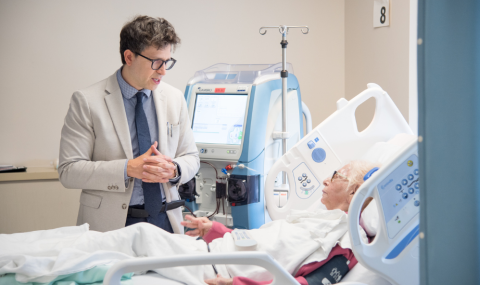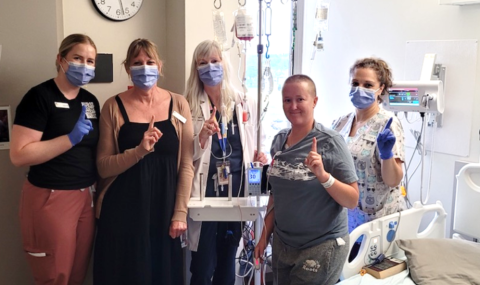Below are some frequently asked questions about the Regional Renal Program's Patient and Family Advisory Council:
Why does the Renal Program have a Renal Patient & Family Advisory Council?
The Renal Program knows that patients and their families have a key role in improving the patient experience with renal care. The Renal Patient & Family Advisory Council (Renal PFAC) provides a way for the staff, physicians and administration to connect with patients and family members, and to get their advice on how we deliver care. The main goal of the Renal PFAC is to help support a patient and family centred approach across the program.
What is Patient and Family Centred Care?
Patient and family centred care is grounded in a partnership between patients, families and health care providers. It is based on the following principles:
Dignity & Respect: Patient and family perspectives and choices are heard and honored. Patient and family knowledge, values, beliefs and cultural backgrounds are incorporated into care planning and decision making.
Communication & Information Sharing: Health care providers share complete and unbiased information with patients and families in ways that are clear, complete, timely, accurate and useful in helping patients and families effectively participate in care and decision making. Patients and families also share all necessary and relevant information with members of their care team.
Collaboration & Empowerment: Patients, families and health care providers collaborate in policy and program development, in professional education, in research and evaluation, and in the delivery of care. Patients are empowered to participate in experiences that enhance control and independence.
Comprehensive & Coordinated: Patients and families receive care that provides physical and emotional comfort and is safe. Patient and families experience care that has continuity and smooth transitions.
What do Renal PFAC Members do?
Renal PFAC members provide advice to the Renal Program so improvements can be made to help other kidney patients and their families. Advisors participate in the discussion about care delivery and services patients and families receive. This is done by taking part in regular Renal PFAC meetings, as well as by helping out on committees and working groups. Sometimes, members are asked to share their personal health stories with patients and families or groups of health care providers, which is a meaningful way to communicate the power of Patient and Family Centred Care. Advisors may also be asked to share the work of the Renal PFAC and how it helps to support Patient and Family Centred Care.
What does the Renal PFAC discuss?
The Renal PFAC gets involved with matters that have the potential to improve the patient experience. Examples include advising on how patient areas are set up and reviewing educational materials. Most times, topics to discuss are brought to the Renal PFAC by Renal Program staff who would like input from patients and families.
What does the Renal PFAC not do?
The Renal PFAC does not take on the cause of a specific patient or family member, or a special interest group. It does not fundraise to support its activities or interests. It is important to remember that the Renal PFAC provides advice to influence decisions in the Renal Program and does not have the final say about how services are delivered.
Who is on the Renal PFAC?
The Renal PFAC is made up of patients and family members from across the catchment of LHSC, who have used the services of the LHSC Renal Program, and its regional satellite partners. Several staff members and leadership members from the Renal Program are on the council as well.
What is the time commitment of a Renal PFAC member?
The Renal PFAC monthly from September thru to June from 5:00pm to 7:00pm at the Kidney Care Centre. Council members are also asked to help out on committees, work groups and special projects throughout the year, which can take varying amounts of time. Often, members are asked for advice and input by e-mail or phone which can very in the amount of time required. When a new member joins the council, we ask for a minimum two year time commitment.
How do you become a PFAC Member?
The first step to becoming a Renal PFAC member is by reading the FAQ sheet and brochure and becoming familiar with the role of the Renal PFAC and its members. If you are interested, we request that you fill out an application form and send to the Renal PFAC Facilitator. An interview is then set up with the council Chair, Vice Chair, Facilitator and one other member from the Renal PFAC.
How do I know if this is right for me?
When sending in your application form for the Renal PFAC, these are some things to think about to be sure this position is right for you.
Do you:
• have a passion for enhancing the health care experience for patients and families?
• have good listening skills?
• respect other’s opinions and perspectives?
• have the ability to see beyond your own personal experience and see the big picture?
• have the ability to promote the image and mission of LHSC through positive interaction with staff, physicians, volunteers and community?
• have the time to commit a minimum of four hours per month to the council?
What kind of training and support is offered to a Renal PFAC member?
What kind of training and support is offered to a Renal PFAC member? Renal PFAC Members will be orientated to the LHSC Advisor Program, and the Renal Program. The Chair, Vice Chair and Facilitator will offer ongoing support. Orientation to a specific committee or project will take place as needed. Members will be reimbursed for parking costs associated with advisor activities, and other travel costs are assessed on an as needed basis. A light meal will be provided at Renal PFAC meetings as well.
How do I find out more about the Renal PFAC?
How do I find out more about the Renal PFAC? If you are interested in finding out more about the Renal PFAC, or becoming a member, please contact:
Renal PFAC Facilitator
Phone: 519 685-8500, Extension. 34411
Email: renaladvisor@lhsc.on.ca


